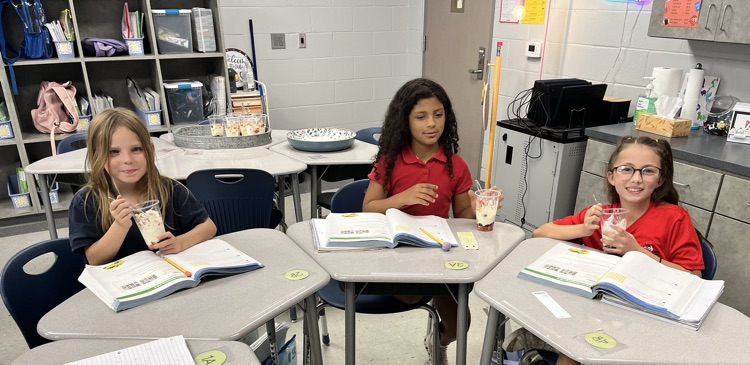Create a routine for conversations about school
Like anything else, conversations with your child about school get easier when they become more routine. You might discuss school on the way home from picking your child up, or after you both arrive at home. Or, make school a regular topic of dinner conversation with your child. In some families, after dinner is a perfect time for a one-on-one chat. You might also try talking as you tuck your child into bed.
https://tpitip.com/?15jS17376
Like anything else, conversations with your child about school get easier when they become more routine. You might discuss school on the way home from picking your child up, or after you both arrive at home. Or, make school a regular topic of dinner conversation with your child. In some families, after dinner is a perfect time for a one-on-one chat. You might also try talking as you tuck your child into bed.
https://tpitip.com/?15jS17376
For reading fun, host a story-writing party
Make reading a pleasurable, social experience to encourage your child to read more. Invite your child's friends to a Write-a-Story party. Each child writes the first sentence of a story on a piece of paper, then passes the paper on to another child to write the next sentence, and so on. When every guest has written a sentence for each story, have them read their stories aloud.
https://tpitip.com/?15jR17376
Make reading a pleasurable, social experience to encourage your child to read more. Invite your child's friends to a Write-a-Story party. Each child writes the first sentence of a story on a piece of paper, then passes the paper on to another child to write the next sentence, and so on. When every guest has written a sentence for each story, have them read their stories aloud.
https://tpitip.com/?15jR17376
Meeting Notice: Special Education Advisory Council (SEAC) Meeting ~Date: Tuesday, October 21st at 4:15 PM ~Location: St. Landry Parish Pupil Appraisal Center ~ We invite all community members to attend. The agenda can be found at https://aptg.co/l9j-c5.
Make time for math activities every day
Not every child is a math whiz. But daily practice can help all students strengthen their math skills. It's important, for example, that students understand math vocabulary, so have your child explain the terms in schoolwork to you. Practice basic math facts by quizzing each other with flash cards and playing math games. For word problems, encourage your child to read the problem several times and draw a picture to help understand the question.
https://tpitip.com/?15jQ17376
Not every child is a math whiz. But daily practice can help all students strengthen their math skills. It's important, for example, that students understand math vocabulary, so have your child explain the terms in schoolwork to you. Practice basic math facts by quizzing each other with flash cards and playing math games. For word problems, encourage your child to read the problem several times and draw a picture to help understand the question.
https://tpitip.com/?15jQ17376
📢 Flu Vaccination Clinic 📅 Please send consent forms to school tomorrow if you would like your child to receive the flu vaccine. The Flu Vaccination Clinic will be held on October 21, 2025 on campus.
🌼 Flowers for the leaders who help our school grow every day! Happy Boss’s Day Mrs. Cortez and Mrs. Hargroder! 💐




There will be no 21st Century after-school tutoring this afternoon, Thursday, October 16, 2025. All students should either ride the bus or get picked up this afternoon. Thank you for your understanding.
The Kona Ice Truck will be on campus Friday, October 17, 2025. Find those refillable cups and put themin your student's bookbag. Prices range from $3 - $7. Please send money with your child in the morning.

Mrs. H Fontenot's Homeroom earned a Parfait party for returning 100% of their Eat Move Grow Participation papers!!!









One family calendar helps you keep track of everything
Has your child ever forgotten about a science project until the last minute? Or didn't have a ride to practice because you were at work? A family calendar can help you avoid scheduling issues. On it, write school events, your child's assignments, reminders about items that must go to school on certain days, sports practices, activities, commitments and special events. You'll be able to keep track of everything and spot conflicts ahead of time so you can manage them.
https://tpitip.com/?15jP17376
Has your child ever forgotten about a science project until the last minute? Or didn't have a ride to practice because you were at work? A family calendar can help you avoid scheduling issues. On it, write school events, your child's assignments, reminders about items that must go to school on certain days, sports practices, activities, commitments and special events. You'll be able to keep track of everything and spot conflicts ahead of time so you can manage them.
https://tpitip.com/?15jP17376
Please check out this week's newsletter for important information.
https://app.smore.com/n/qr6bj
Read more about:
- October 16 - Students return
- October 16 - Jeans for Candy - students may wear Jeans for a bag of candy
- October 17 - Kona Ice will be on campus
- October 17 - We are turning Port Barre Elementary PINK for Breast Cancer Awareness on Friday, October 17, 2025, and we are throwing it back to the 70s!
https://app.smore.com/n/qr6bj
Read more about:
- October 16 - Students return
- October 16 - Jeans for Candy - students may wear Jeans for a bag of candy
- October 17 - Kona Ice will be on campus
- October 17 - We are turning Port Barre Elementary PINK for Breast Cancer Awareness on Friday, October 17, 2025, and we are throwing it back to the 70s!
👖 Jeans for Candy! 🍬 This Thursday, October 16, students may wear blue jeans in exchange for bringing a bag of candy! Your sweet donation will help make our October celebrations extra fun for everyone! 🎉
Please remember:
🔸 No nuts or peanut butter — we are a nut-free school.
✅ Jeans must be school appropriate
❌ No rips, tears, or holes
Thank you for your support — we can’t wait for a fun-filled fall! 🎃🍂
Please remember:
🔸 No nuts or peanut butter — we are a nut-free school.
✅ Jeans must be school appropriate
❌ No rips, tears, or holes
Thank you for your support — we can’t wait for a fun-filled fall! 🎃🍂

For better behavior, predict, prepare and practice
When it comes to correcting behavior, don't wait until after a problem arises to plan what to do. Instead, think "predict, prepare and practice." Predicting a behavior lets you brainstorm ways to prevent it. Then you can try out your solutions. For example, if you predict your child will be late in the morning, prepare by having your student lay out clothes the night before. For practice, see if your child can set a "personal best" time for getting dressed.
https://tpitip.com/?15jO17376
When it comes to correcting behavior, don't wait until after a problem arises to plan what to do. Instead, think "predict, prepare and practice." Predicting a behavior lets you brainstorm ways to prevent it. Then you can try out your solutions. For example, if you predict your child will be late in the morning, prepare by having your student lay out clothes the night before. For practice, see if your child can set a "personal best" time for getting dressed.
https://tpitip.com/?15jO17376
💗 Port Barre Elementary is PINK and PROUD! 💗
Friday our amazing staff wore their “Fight Like a Red Hot” shirts in honor of Breast Cancer Awareness Month. 🎀
Together, we stand strong, show support, and spread hope for all those who have been affected by breast cancer. 💪❤️
#FightLikeARedHot #BreastCancerAwareness #PBEProud #RedHotStrong




🌿💚 Port Barre Elementary Goes Green for 4-H! 💚🌿
Our students showed their 4-H pride by wearing green last Thursday in support of the amazing work 4-H does in our schools and community! 🌱 From learning leadership and responsibility to growing through hands-on experiences, 4-H helps shape tomorrow’s leaders — and we’re proud to stand behind them! 💪🐄🍀
#PBEProud #4HSpirit #GoGreen #LilRedHotsSupport4H








🕺✨ Show your support and style! We are turning Port Barre Elementary PINK for Breast Cancer Awareness on Friday, October 17, 2025, and we are throwing it back to the 70s!
💖 Wear your boldest pink
✌️ Rock your best 70s outfit - bell bottoms, peace signs, funky shades, and flower power vibes are all welcome! Remember the color is pink .🕺🌸✌️
🎶 Spread peace, love & awareness
Get groovy, get pink, and let’s make a statement together! #PortBarreElemGoesPink #70sVibes #BreastCancerAwareness
💖 Wear your boldest pink
✌️ Rock your best 70s outfit - bell bottoms, peace signs, funky shades, and flower power vibes are all welcome! Remember the color is pink .🕺🌸✌️
🎶 Spread peace, love & awareness
Get groovy, get pink, and let’s make a statement together! #PortBarreElemGoesPink #70sVibes #BreastCancerAwareness

Communication skills are the stars of this show
Kids who know how to listen and express themselves have an easier time in school. They also have less trouble making friends. The best way to build your child's skills is by example. Make eye contact when your child speaks. Listen without interrupting or judging, and ask questions to show your interest. To help your child practice communicating effectively, pretend to be talk show hosts and take turns interviewing each other.
https://tpitip.com/?15jN17376
Kids who know how to listen and express themselves have an easier time in school. They also have less trouble making friends. The best way to build your child's skills is by example. Make eye contact when your child speaks. Listen without interrupting or judging, and ask questions to show your interest. To help your child practice communicating effectively, pretend to be talk show hosts and take turns interviewing each other.
https://tpitip.com/?15jN17376
📢 Flu Vaccination Clinic 📅 The Flu Vaccination Clinic will be held on October 21, 2025 on campus. If you would like your child to receive the flu vaccine, please fill out and return the consent form to the school. Consent forms were sent home with students last week. Consent forms are due back by Thursday, October 16.

Keep an eye on your child's after-school schedule
After-school activities can enrich your child's life. But sometimes, even a good thing can be too much. From time to time, review your child's schedule. Does your child enjoy all the activities? Does your student have time to complete schoolwork? Does your child have time to read, play and relax? Do activities cause stress? If you suspect your child is overcommitted, talk together about dropping an activity.
https://tpitip.com/?15jM17376
After-school activities can enrich your child's life. But sometimes, even a good thing can be too much. From time to time, review your child's schedule. Does your child enjoy all the activities? Does your student have time to complete schoolwork? Does your child have time to read, play and relax? Do activities cause stress? If you suspect your child is overcommitted, talk together about dropping an activity.
https://tpitip.com/?15jM17376
Set your child up for success with assignments
What can you do to help your child succeed with schoolwork at home this year? First, make sure your student has a quiet, well-lit place to work, a regular daily study time and basic supplies, such as paper, pencils, pens and a ruler. Then, ask questions, such as: What's your assignment today? Is it clear? When is it due? Do you have a long-term assignment? Have you made a plan for completing it? Do you need any special resources?
https://tpitip.com/?15jL17376
What can you do to help your child succeed with schoolwork at home this year? First, make sure your student has a quiet, well-lit place to work, a regular daily study time and basic supplies, such as paper, pencils, pens and a ruler. Then, ask questions, such as: What's your assignment today? Is it clear? When is it due? Do you have a long-term assignment? Have you made a plan for completing it? Do you need any special resources?
https://tpitip.com/?15jL17376
